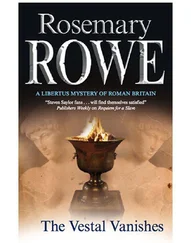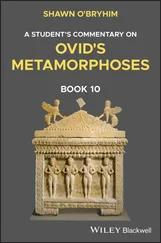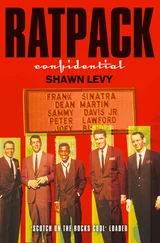Dean says he’s praying about what to do. About whether they might find a new home here, on his family’s land. In his father’s house. He tells the family he’s praying about this, and he tells Loretta — in these first days since he came to retrieve her — that he’s praying about this, but Bradshaw told her that he was already making plans to move the business to Idaho. Dean has even asked Bradshaw if he would help run it.
“He wants to pay me to come up there. Isn’t that something?” Bradshaw said, delighted. “Doesn’t the Lord work in mysterious ways?”
A demon. She feels sure of it now. How else could this be happening? How else could it be that her husband is bringing Bradshaw into the family? Dean’s God, she feels more and more, is a fake. Dean’s God is simply Dean’s mind. But the world behind the world is real. Something must operate behind everything — guiding, shaping, directing. She cannot imagine otherwise, and Bradshaw comes from that place.
Dean arrives in the living room dressed in his black suit, his beard darkened and damp. He has lectured them about his brother Louis and his family, who are well meaning but misguided, and whom they should embrace and mistrust in equal measure. The children are aligned perfectly, militarily, descending by age: Samuel, Ruth, Elizabeth, Dean Jr., Janeen, Sarah, Benjamin. And Ruth at their head, like a sergeant. Loretta stands behind them all.
“I expect you all to be on your best behavior,” Dean says. “Good manners at the table. Polite to your aunt and uncle. Do not make your mother and me ashamed. Don’t make me go to the belt.”
Dean goes to the belt about once a day. The backs of Samuel’s legs, Loretta knows, are chapped with calluses, which he earns for his stubborn, silent rebellions — refusals to complete chores, to finish his bulgur meat loaf. Dean nags him relentlessly, reminding him that he is the eldest, and he is falling short.
“You understand that we have to be less than honest regarding your aunt Loretta,” he says. “We have no choice in this. We are no longer in Short Creek, among the righteous. We are no longer among those who understand the righteousness of the Principle. Satan is in control out here.”
“At Uncle Lou’s?” Samuel asks, and Dean gives him a silent look.
“Everywhere. The world over. Your uncle is not an evil man. But neither is he a righteous one. And Satan is ever watchful for opportunities to tempt and persecute the righteous.”
Loretta knows that Dean considers himself a perfectly righteous man, though he would never admit it out loud. A perfectly righteous man would not be so vain. How do you come to feel that way about yourself? How do you ever feel so fully synchronized with the purpose of the universe? There must be a beauty in that feeling. Sometimes she thinks of the world as Dean versus Bradshaw. And other times she thinks of the world as Dean plus Bradshaw, different expressions of the same confidence.
“Okay, then,” Dean says, and Ruth opens the front door and the children exit in single file, through the screen door and onto the front step, the red paint walked off in the middle, and onto the path worn into the lawn. Then Loretta goes, then Dean, then Ruth, and the children wait for Dean to take the lead. They walk out onto the gravel shoulder of the narrow county road and begin walking the quarter mile toward Uncle Lou and Aunt Becky’s. The heat of the past month is cooling, but still Loretta feels too warm in her long dress and wool stockings, a hint of dampness already inside her lace-up shoes, at the tight neck of her dress. They begin walking up the small rise that separates the two homes, the harvested hay fields to their left, and the cow-filled pasture on their right, and a pickup roars over the top, a dirt-caked Ford F-150 with a cracked windshield. The plump, red-faced man inside turns to watch them as he passes, looking mystified and pleased, here on this ordinary road that he must drive all the time without the magic of any surprise.
When Dean came to The Crick to get her and their belongings, to fill the horse trailer with the boxes that Bradshaw helped them load, bantering with Dean, making him laugh and shake his head, when he came for her and had her by his side as he prowled through the house, choosing what would be needed and what could be left behind for now, he had taken her into his office while he compiled certain papers and locked others into his steel filing cabinet. He had opened the bottom drawer of the cabinet and removed a strongbox that he opened with another small key, and then had shown it to her with wide eyes, with shared amazement: a pile of gold coins, shined carefully, an incoherent pile of one-ounce golden eagles, thousands of dollars’ worth of gold. He had removed eight coins, and relocked the box, and placed it back in the cabinet.
“You’re leaving that here?” Loretta had asked.
“For now,” Dean said. “For now.”
He looked at her gravely, lips pressed and brown eyes brightened. She could sense in him an assessing mood, an evaluative moment — the kind of seriousness that might come over him in prayer or spiritual leadership, his sense of himself expanding even as he adopted a veil of humility.
“What?” she asked.
“If I show you something,” he said, “you must promise me to hold it as a sacred secret.”
“I promise, Dean.”
He withdrew a leather pouch tied with a cord, sagging as if it held a misshapen grapefruit, and held it toward her, fist tight around the top, his chapped red knuckles as big as walnuts and one black crack running across his thumbnail.
“Take it,” he said. “Feel it.”
She reached out, and he said, “Use both hands,” and he set the pouch in her cupped palms, and said, “Don’t drop it, little sister,” smiling, thrilled, looking as he did sometimes in bed, beforehand, ready to climb on, his brown eyes backlit with intensity. She felt the contents of the bag settle and shift as he gave it to her, and it nearly forced her hands to the floor, so great was the distance between its weight and her expectation of its weight.
“What is it?”
“It is gold, little sister.”
He was whispering, inches from her face. She had never felt so intimately connected with him. She set the pouch on the floor and opened the top.
He whispered, “It is gold from the California gold rush. Some of the first ever discovered — by Saints. By Saints, little sister.”
She opened the top of the pouch tremblingly. Inside, the lumps were dark and brownish, but for a few tiny gleaming curves, where the lumps of ore caught the light.
“Discovered by Saints, Loretta, though you will never hear it spoken of by the Gentiles. They say a man named John Sutter discovered the gold, in a place called Coloma in California. They named it Sutter’s Mill. You can read all about him in the histories. In the schoolbooks of the Gentiles, his story is well told.”
Loretta reached in and took up a single nugget. It felt almost soft between her finger and thumb, as if she might mash it.
“But you will never hear the Gentiles talk of the Saints in Sutter’s Mill, and how the Saints settled California, how the Saints discovered the gold. You will never hear the Gentiles tell the truth about that, little sister, because what if they did? What if they had to accept the righteous history of the nation? That it was the Saints — the ones everyone repudiated, the ones everyone scorned and scorns still, the Saints, abandoned by their own church, ostracized by all — it was the Saints leading from the very first, Loretta. Setting the example.”
Loretta had stopped noticing anything but the small lump of gold. Gold. She hadn’t conceived of it like this before — as a substance of the earth, a rock. Dean reached out and took it from her, and placed it back in the pouch as he continued talking about it, telling her it was sacred gold, Mormon gold, and that this particular gold had been held in the hands of the true Saints for more than a hundred years. Saints had left Utah and gone to California, and gold had come back to Salt Lake and bolstered the new Zion under Brigham Young.
Читать дальше












